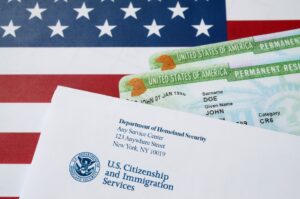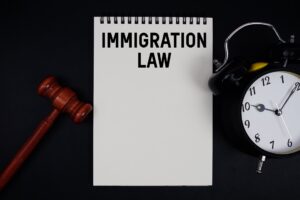You may be wondering how to respond to USCIS RFE if you have received a request for evidence for your immigration case. Although this is not necessarily something to worry about, you do need to take it seriously and respond in the correct way before the deadline. Failing to do so could result in a denial. Keep reading to find out how to respond to a USCIS RFE and why you may receive a request for evidence.
What Is a Request for Evidence (RFE)?
Before we discuss how to respond to a USCIS RFE, what is a request for evidence? The USCIS may send you a request for evidence if your immigration petition or application does not have enough documentation for a decision to be made. In many cases, this is actually a good thing as it allows you to provide the needed evidence for the best chance of being approved.
The USCIS will mail you a request for evidence, and your immigration case will be put on hold until you send your response or the response time is over.
Steps to Responding Effectively to an RFE
If you have received a request for evidence, there is a USCIS RFE checklist you need to follow to correctly respond. Responding correctly is crucial if you want to avoid a USCIS denial for your immigration case.
Here is the step-by-step process of how to respond to a request for evidence:
- Read the notice: The very first thing you need to do when you receive an RFE is to read the notice to understand why more evidence is necessary. This will help you to determine where you went wrong and what evidence you need to send as a response.
- Gather documentation: The next thing you need to do is locate and organize all of the additional documentation or evidence that is requested. You should try to only provide the documents that are needed, but it is always better to provide more than is necessary than not to provide enough.
- Write a response and cover letter: After gathering documentation, you also need to write a response letter to the RFE as well as a cover letter that summarizes the evidence inclosed.
If you have received a request for evidence, it is essential that you hire an immigration attorney before you respond. An attorney can help you create a USCIS evidence request strategy for the best chance of having your case approved and moved forward.
What Happens If You Miss the Deadline or Provide Incomplete Evidence?
When you receive a request for evidence notice, you need to identify the deadline for your green card RFE response. It is essential to respond before the deadline; otherwise, it is guaranteed that your case will be denied, and you will have to start all over again.
Also, if you fail to provide the evidence that is requested, this will usually result in a denial. Only in rare instances will the USCIS send a second RFE if further clarification is needed.
When you hire an immigration attorney, they can help you clearly identify the evidence the USCIS is requesting. They can also help you track down harder to find documentation to ensure you do not accidentally submit incomplete evidence.
Tips to Avoid Getting an RFE in the First Place
Even though a request for evidence is not an immediate immigration case denial, it can still be stressful. Also, having to provide additional evidence will delay your immigration case as it will be put on hold until the USCIS receives your response and reviews it. This could potentially delay your case by several weeks or months.
The good news is that there are several things you can do to avoid receiving an RFE for your application or petition.
Understand the Required Documentation
Every immigration category is going to have its own list of requirements, especially when it comes to documentation and evidence. Before you ever start the immigration process, you need to understand this aspect of your application so that you know exactly what to provide. This is also essential for making sure you are applying for the correct visa and have met all of the eligibility requirements.
File Accurately
Once you have determined that you are applying for the correct immigration category, you also need to make sure you file accurately. Immigrants commonly receive requests for evidence if they have either submitted an incomplete or inaccurate immigration application.
You need to double check all of the forms to make sure the information you have provided is accurate and clear. You should also double-check for any small errors or information that doesn’t line up.
Keep in mind that you will also need to have all of your documents translated into English if they are in a different language.
Get Legal Assistance
For the best chance of submitting a successful immigration application without receiving an RFE, you need to get legal assistance. An immigration attorney will have extensive experience submitting successful applications and petitions.
An immigration attorney can review all of your documents and applications to make sure they are accurate and provide complete information.
Hire an Immigration Attorney Today
Are you worried about the USCIS RFE response time? Contact us today at U.S. Immigration Law Counsel at 800-666-4996 to speak with an immigration attorney about your situation. We will deal with the government, so you don’t have to!
FAQ Section
How long do I have to respond to a USCIS RFE?
The average USCIS RFE response time is anywhere between 30 to 87 days, depending on the notice.
Can I submit additional documents not requested in the RFE?
Yes, as long as you believe that they will strengthen your case and are relevant to either your application or the reason for the RFE.
What if I need more time to gather documents?
Unfortunately, extensions for RFEs is not allowed, so you either have to submit by the deadline or risk having your case denied. The best solution is to avoid receiving an RFE to begin with by submitting a strong application that meets all of the documentation requirements.




